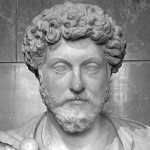The thing about happiness, and how it differs from other experiences like fun and excitement, is that it’s largely based on unchanging universal principles. So, even dead philosopher-kings from antiquity can teach us a thing or two about the subject.
 Marcus Aurelius ruled the Roman Empire from 161 to 180 A.D., as the emperor who banned the gladiator games in Rome. His name may have the ring of familiarity to those who saw the Russell Crowe movie, Gladiator. In any event, Aurelius produced a work of thought titled, The Meditations.
Marcus Aurelius ruled the Roman Empire from 161 to 180 A.D., as the emperor who banned the gladiator games in Rome. His name may have the ring of familiarity to those who saw the Russell Crowe movie, Gladiator. In any event, Aurelius produced a work of thought titled, The Meditations.
The quotes in this post are from that work:
LESSONS OF HAPPINESS FROM A PHILOSOPHER-KING
There are legitimately painful parts of life. We age. People die. Economies falter. Homes are lost. People disappoint. Dreams evaporate. Life happens. And yet, we still have more control over our reactions to even the most difficult trials than we give ourselves credit for.
Some are crushed by circumstances, turning bitter and angry. Others, under the weight of the same circumstances, become compassionate and humble. Why the difference?
You have the capacity to choose your response to life.
“If you are distressed by anything external, the pain is not due to the thing itself but to your own estimate of it; and this you have the power to revoke at any moment.”
~ Marcus Aurelius
You have the power to decide to learn from pain. You can focus on the sorrow, or focus on the lesson it teaches. One hurts more; the other less.
So, if life is painful, change the way you think about it. If sorrow fills your soul, alter your perception of the things causing you sorrow. If life is little more than a series of disappointments, develop a new way of interpreting what disappoints you.
“The happiness of your life depends upon the quality of your thoughts … take care that you entertain no notions unsuitable to virtue and reasonable nature.”
~ Marcus Aurelius
You can’t control what happens; but you can control what you think about what happens.
You can’t control the traffic, but you can decide to focus on the delay and congestion and bad drivers doing stupid things. You can let what you’re missing – the show, the kids, the date, the game – work you into a white-knuckled road-raging lunatic.
But it won’t change the fact that you’re still stuck in traffic. Nothing external is altered. But everything internal is.
Such an attitude changes how you experience the drive home … and how your family experiences you once you get home. Then kids, the spouse and other family members get the worst, instead of the best you.
“Our life is what our thoughts make it.”
~ Marcus Aurelius
Make no mistake about it: You are in the driver’s seat of both the car stuck in traffic and the emotions stuck in the muck of anger.
But you can choose differently. You can simply choose to enjoy the extra time you have with yourself, to listen to good music or catch up on the news or listen to a book on tape, or learn Japanese with a foreign language program, or think deeply about meaningful things.
You can make your car a traveling university as you rent, borrow or buy CDs about history, politics, economics, relationships, goals, biology, astronomy, health, happiness, whatever.
Do you see the difference in attitude? One is adrift on the tide of external things. The other is at the helm, steering the emotional ship with purpose and direction … and deep into the waters of happiness.
Follow this link for more ancient wisdom on happiness from Marcus Aurelius.
What do you think?
Have you experienced the power of thought in your life? Please comment!







































No Comment